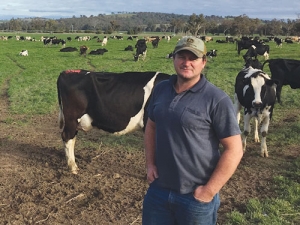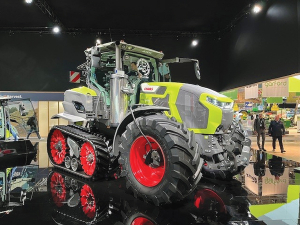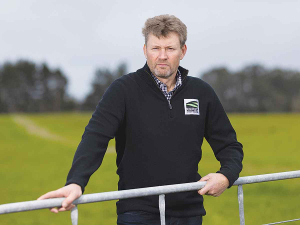Australian farmer Travis Thompson has a clear vision for the sheep and cropping country surrounding the dairy farm he manages in the New South Wales Riverina.
He sees opportunity to develop a sizable dairy industry based on the type of large-scale feedlot system more common in parts of the northern hemisphere.
“That model says ‘you don’t have to be the ridgy didge dairy property to milk cows’; it could be any property that houses a cow,” says Thompson.
“There’s opportunity for that and it will happen, because of overseas investment and Australia’s appeal…. We are a pretty big grain belt so grain is available all year and the transport is fairly easy.”
Ample local supply of grain and strong interest in feedlotting has guided the rapid expansion at Binnowee Dairy overseen by Thompson since he relocated from Victoria three years ago. Stocking has risen from 300 to 650 cows and milk production has doubled on the 1400ha property at Oura, east of Wagga Wagga.
The herd is now 70% Friesian plus Brown Swiss, Jersey and crossbreeds. In three separate herds they produce 5 million L of milk a year averaging 4.2g/L fat and 3.4g/L protein.
Each cow is removed from the milking herd at 218 days pregnant and is put on pasture for five weeks.
The dry herd remains steady at about 150 head with calving occurring at an average of 60 a month for the entire year. The remaining 500 head are separated into two groups milked twice a day.
Pregnant cows in milk for at least 200 days are kept in a herd that averages 18L/cow.
A higher performing herd that has done no more than 200 days in milk averages 34L/cow.
“We try to feed our best quality feed to our most productive cows,” Thompson says.
In winter the high production herd is fed on pasture once a day and then put on a feedpad directly before and after milking. In the summer cows are fed mostly on the feed pad.
“We’ve changed our thinking a couple of times on feedlotting cows but we use the feedpad quite a bit,” Thompson says. “We may go 100% feedlot and grow as much feed as we can then feed it to them there.”
The feedpad mix is citrus pulp, corn silage, oat, hay, canola meal and wheat.
Lucerne, annual ryegrass and corn are grown on the property with 900 megalitres of irrigation and 530mm average annual rainfall.
Thompson calculates feed costs fluctuate between A20-26 cents/L of milk produced.
“The cost of milk production here is obviously higher than in Victoria,” he says. “If you’re a pasture based dairy farm [you will produce milk cheaper than we do] and we can’t grow pasture at certain times of the year so we’ve got to grow crops and feed them on a feed pad.”
The farm’s rapid expansion is prompted partly by a desire to offset the risk of dairy farming in a region with just one processor -- Fonterra’s Wagga Wagga fresh milk factory.
“We’d like to have a bit of pull: if a milk processor wants your milk and you can produce up to 10 million L you would think you would be wanted,” says Thompson. “And… we have to make enough milk and money to be profitable.”
With Thompson as manager are four fulltime staff. The farm is jointly owned by two families more or less involved in running things.
The farm also runs some beef. Bull calves are kept and grown to 400-500kg then sold to an abattoir. The annual sale of up to 200 grown Friesian steers allows the business to capitalise when the beef price is strong.
But expanding the dairying is Thompson’s main concern, provided they can acquire more land. “With our 650 cows it is probably maxed out, so to grow we would look at purchasing some more property and setting up another dairy.”


















